Inspiration from the Grandparent Connection
We are humbled to share a blog post called “Muscle and Momentum” from Richard Reilly – known as “Poppy” to his grandson Louis – and appreciated as both a generous friend and trusted adviser to GiGi’s Playhouse. Richard’s eloquence and passion are truly incredible, and we are excited to begin sharing monthly blog posts from Richard and the Grandparent Connection. Thank you Richard for believing! Thank you Louis for achieving!
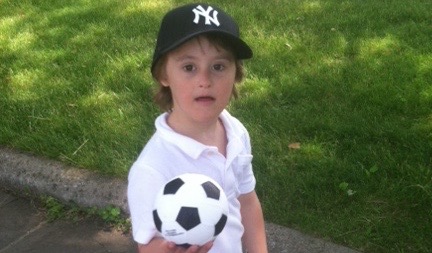
I remember the day my grandson nearly drowned – and he was in my arms at the time.
I was holding Louis (pronounced Louie) in a friend’s pool standing only waist deep. No need for a floatie or preserver. Wrong! One of the bigger kids tugged at me and I lost my footing on the sloping pool floor. We suddenly found ourselves in deep water. His soft little body slipped from my grasp as I struggled. We both went under. I saw him suspended, arms raised, eyes stoically staring at me. It haunts me.
Regaining my footing, I made a mighty leap, pushing upwards on his bottom and landing him on the concrete curbing of the pool. He was quite unperturbed, but I was shaken.
Hypotonia is the technical term. We often call it low muscle tone: more flexibility and weakness, less resistance and control. It is prevalent in people with Down syndrome. Fortunately, it is addressed through therapies during the early intervention years, but afterwards even a grandparent in the know can take it for granted. Continued physical fitness and activity are essential for improvement.
Those with disability tend to get less exercise that those without. Moreover, their need for exercise is greater, especially because of a propensity for obesity inherent with Down syndrome. Individual sports and activity provide the optimum “playing time”. And as in any exercise program, the benefits transcend to the entire body.
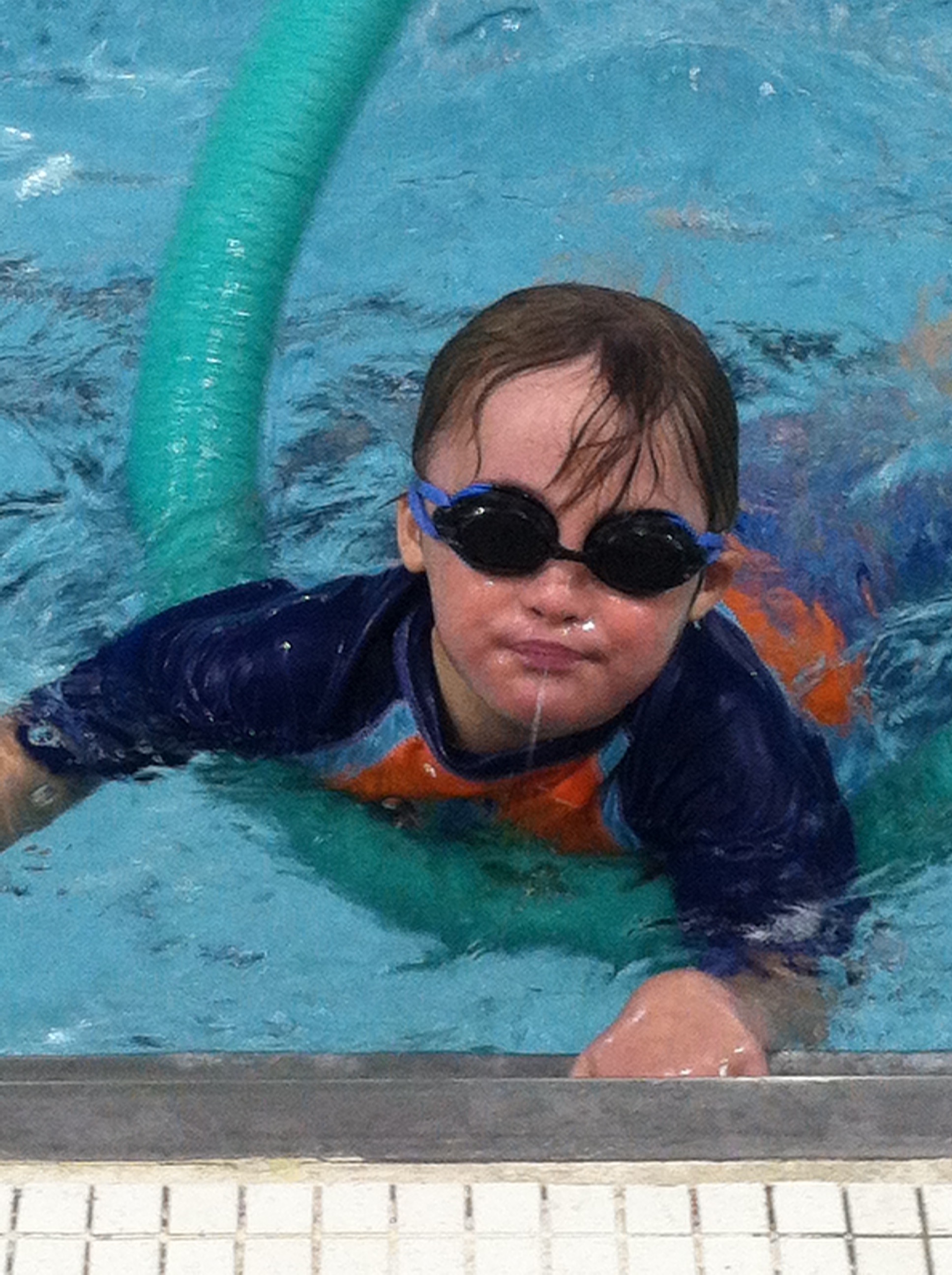 Swimming lessons! It’s been a few years – Louis is now seven. He’s like a fish in water. He fearlessly plows the water with his arms and legs. He floats on his back. He loves to swim underwater. He takes lessons at a pool near his home in Brooklyn. We shoot baskets in the pool at our local YMCA.
Swimming lessons! It’s been a few years – Louis is now seven. He’s like a fish in water. He fearlessly plows the water with his arms and legs. He floats on his back. He loves to swim underwater. He takes lessons at a pool near his home in Brooklyn. We shoot baskets in the pool at our local YMCA.
Speaking of baskets, Louis’ all-time favorite sport is basketball. We shoot hoops at Poppy’s (that’s me) driveway court. He’s made eight in a row – can you do that? He loves to “trash talk” back and forth with me, insulting then praising each other’s shots. I set the rim at 7ft. to give him just the right challenge, building his self-esteem, muscles, coordination and endurance. Back in Brooklyn, he holds his own at basketball practice where his teammates are all typical kids.
Louis loves running, soccer, camping and hiking, the beach, the playground. All activities that will serve him well in his near future and beyond.
The two of us share a singular bond. Yes, special needs is a part of it, but we all have special needs. Louis gets such a kick out of him being seven and me being seventy! My needs seem to increase, but we both strive to reduce his needs. He is quite perceptive. Already we have conversations about college and independence. Premature? Just sowing the seeds – he remembers. Louis is always excited about a possible “adventure”.
On a recent visit to Brooklyn I brought Louis’ Big Wheels bike along. He sat on it in the front parlor and finally realized he could give himself a push-off with his feet to get the pedals going, then start pedaling, just like I’d been telling him all along. With great drama he proudly declared, “Poppy, I can do it by myself!” And so he did, down Prospect Place, past the stores on 5th, a turn up the hill on St. Mark’s Place and back onto 6th to home. The Big Wheels has been a great learning tool for Louis. First, for any kid, it’s fun. He works on the muscles and the mind: pedaling, steering, stop, go, right, left, perceiving what’s ahead, obeying commands. The rubber tire I stretched over the plastic one solved the slippage problem. An achievement for both of us.
Louis’ speech is improving also. Yes, speech is related to muscle tone, too. Figuring out how to use the muscles in the mouth is key. When Louis was a toddler, he was bursting with babbling sounds. One day I encouraged him to repeat a word after me. I said it once, twice. He made an attempt. The third time, I placed his small hand on my lips, the other on my throat as he looked directly in my eyes. His first word was “YES!”
No, I’m not a speech pathologist, I’m a grandfather. The attempt was based on a gut intuition. Since those early days, Louis has immeasurably benefitted from a method of speech therapy called “Prompt”. Twice a week since he was three. Effective speech, for anyone, is a positive. For those with Down syndrome it is a life changing door to acceptance and inclusion.
Next on the agenda? Learning to ride a two-wheeler – we’re not talking training wheels here. This skill rates as one of the top best practices. Check out what researchers have to say: www.down-syndrome.org/ reviews/2074/. Come spring, we’ll be out on our street, Buttonball Trail, same place where Abby and Maggie learned. It’s Louis’ turn now. It ain’t about Down syndrome, it’s about learning to ride a bike!
Louis has a huge fan club, lots of people on the journey who all coach him as he joyfully takes on life. Poppy, Grandma, Mimi and Pa are the grandparents who are there for him every week. Mom and Dad, Abby and Maggie are his core. His nanny, teachers, therapists, coaches bring him security, structure and learning.
My grandson is fortunate to have such a network of support. It’s a big world out there, not all have this. Louis inspires me with his ability to try. We both benefit. Imagine if we all tried together? It’s what we do at GiGi’s Playhouse.
Richard Reilly
The Grandparent Connection
Recent Posts
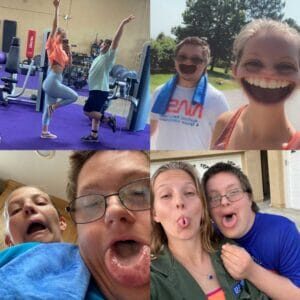
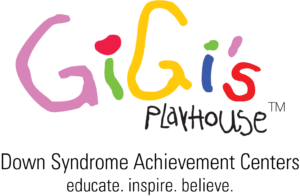
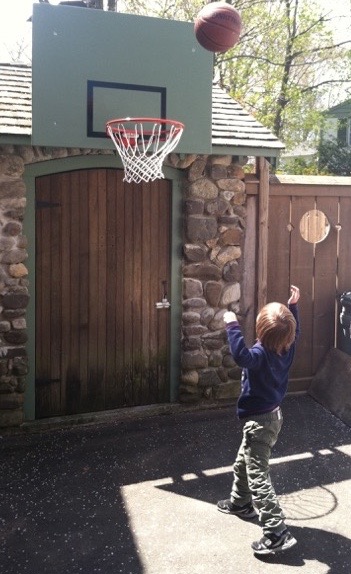
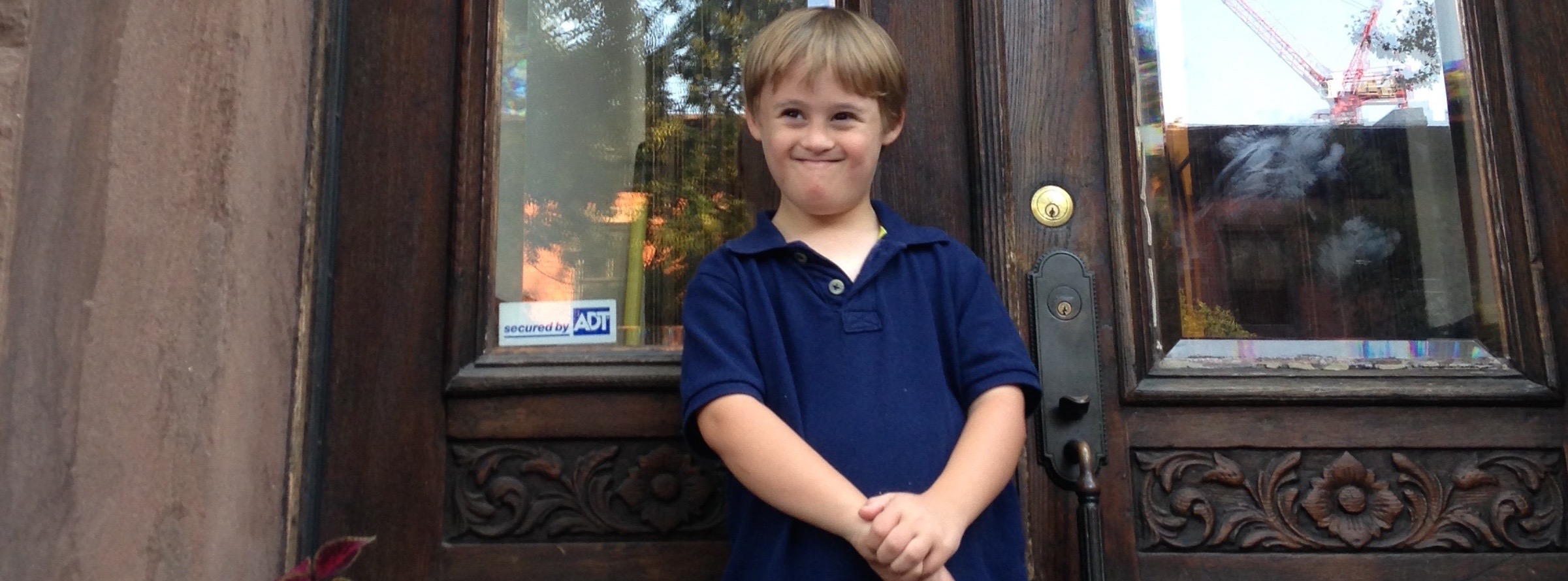
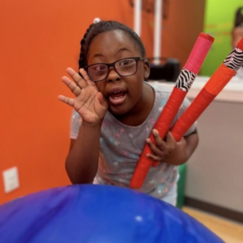
I grew up with no grandparents and share no emotional connection to them, am I missing out on something special?
Hi Neil, are you missing out on something special? Should you have the good fortune of becoming a grandfather you will answer your own question. Neil, think of your best friend and the nature of that relationship. Probably trust is the core component. It is the mutual factor we share in our relationship, my grandchildren and myself. One day Maggie was stuck climbing the tree in our yard. She called for me. I came. She climbed higher. She knew I was there for her one way or the other. Relationships are what we make them. Richard